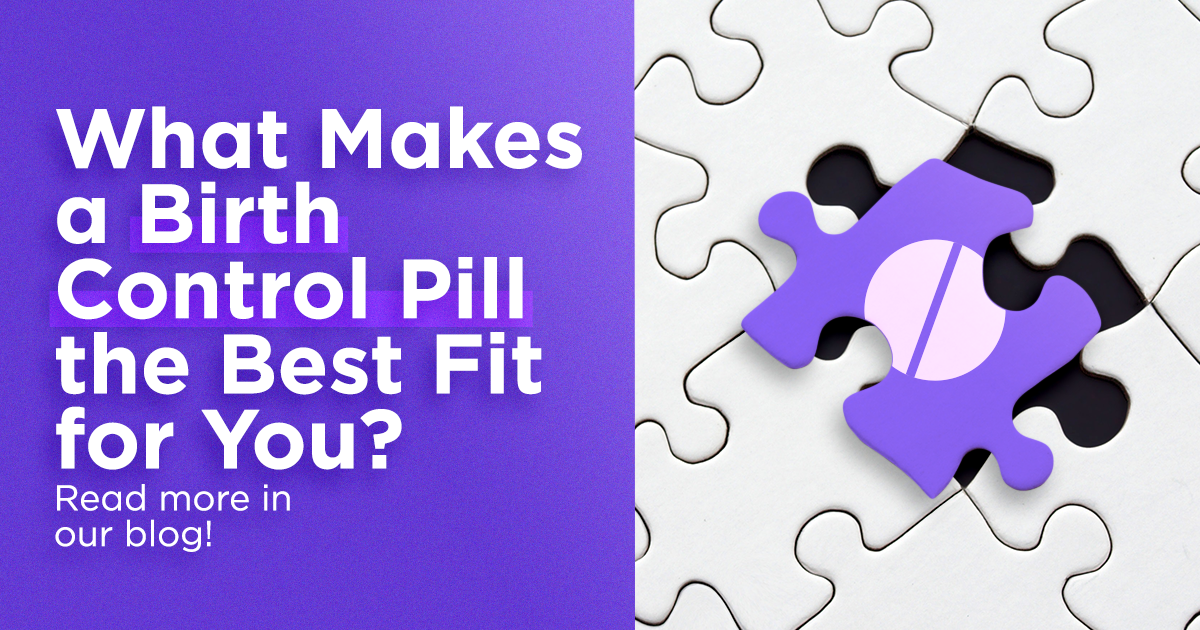Birth control pills are an affordable and effective way to prevent pregnancy, and they can have many other benefits. Once you have decided on pills out of the many options for birth control, the next step is to navigate the various types of pills available.

Keep reading to find out more about the different types, which pill is best for specific issues, and how often you need to take each (continuous vs. a 28- or 91-day cycle).
Combined Oral Contraceptives
Combined Oral Contraceptives, COCs, are birth control pills with both estrogen and progestin. They prevent pregnancy by stopping ovulation and making it harder for sperm to enter the uterus.
There are many doses and types of estrogen and progestin in different pills. Your gynecologist will be able to recommend the right pill for you.
Effectiveness:
The pregnancy rate with typical use of COCs is 5 to 7 per year per 100 users. This means 93 to 95 percent of women taking COCs will be successful.
Benefits of COCs:
- May make your period lighter and more regular
- May reduce the severity of menstrual cramping
- May help treat acne and reduce unwanted hair growth
- May reduce PMS
Schedules for COCs:
The different types of birth control pills have different schedules for your periods. And women taking continuous pills usually have no periods.
Combined hormonal pills can be taken either in a cycle (every 4 weeks or every 12 weeks) or continuously. This means that you may have a period every month, every 3 months, or stop periods altogether.
- 28-day pills—Take one pill at the same time each day for 21 days, then off for 7 days, then start a new pack. Or take one pill at the same time each day for 24 days, then off for 3 days, then start a new pack.
- 91-day pills—Take one pill at the same time each day for 84 days, then off for 7 days, then start a new pack.
- Continuous pills—Take one pill at the same time each day for as long as you want to stay on the pill.
Myth About Skipping Your Period:
You may have heard that it is unsafe and unnatural to skip your period while on birth control pills. It is a MYTH that the bleeding you have while on cyclic birth control pills is your natural period and should not be skipped. All birth control pills prevent ovulation, and they prevent a build-up of the lining of your uterus. As a result, your uterus does not need to shed its lining while you are taking birth control pills.
Side effects of COCs:
Estrogen dosage
If you have bothersome breast tenderness, a lower dose may be better, but if you tend to have break-through bleeding, you may need more estrogen.
Progestin dosage
This is the area where pills tend to differ the most. There are many types of progestins. Some are better for acne, hair growth, and other issues. Others may be better for bleeding problems, moodiness, or low sex drive.
If you are experiencing side effects on a pill, your doctor can help you choose a better fit.
Progestin-only Pills
Progestin-only pills, POPs, are another effective option for birth control. They help prevent pregnancy by making it harder for the sperm to enter the uterus, and sometimes by stopping ovulation.
Effectiveness of POPs:
The pregnancy rate with typical use of POPs is 7 to 9 per year per 100 users. This means 91 to 93 percent of women taking POPs will be successful.
Benefits of POPs:
Progestin-only pills are a good option for women who cannot take pills with estrogen
For example, due to high blood pressure, migraines with aura, a history of blood clots, or are taking other medications that cannot interact with estrogen.
Schedule:
- POPs must be taken every day at the same time.
- They come in a pack of 28 without placebo pills and are taken continuously with no breaks.
- If you are on POPs, your uterine lining will become very thin. As a result, your periods will become lighter and lighter and will be irregular. Many women on POPs will eventually have no periods or occasional bloody discharge or spotting.
Side effects of POPs:
The most common side effect is persistent irregular bleeding. The bleeding is usually light, but for some women can be bothersome.
Acne, oily complexion, and moodiness are also occasional side effects.
Involving Your Doctor
Each type of pill has risks and side effects. Discuss them with your doctor as your pre-existing health conditions and medications need to be taken into consideration. Also, think about what schedule of pills you would prefer.

Seattle Clinical Research Center routinely conducts research studies for new investigational birth controls. Find out how you can get involved in currently enrolling birth control research studies here.
References:
https://www.acog.org/Patients/FAQs/Progestin-Only-Hormonal-Birth-Control-Pill-and-Injection
https://www.acog.org/Patients/FAQs/Combined-Hormonal-Birth-Control-Pill-Patch-and-Ring



